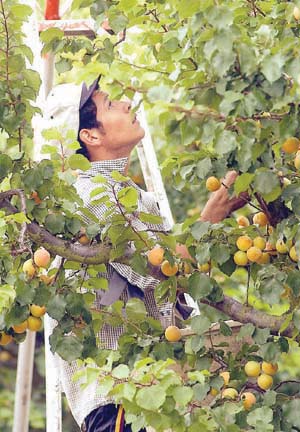
It’s been four years since Gonzales Farms in Hollister has seen
a profit from their Blenheim Apricot trees.
It’s been four years since Gonzales Farms in Hollister has seen a profit from their Blenheim Apricot trees.
“We went from shipping 60 tons, to six tons to nothing,” Owner Patti Gonzales said.
The Gonzales family, which has taken out 10 acres of its apricot orchards this year, isn’t alone. During the past 10 years, Blenheim apricots – renowned by gourmet chefs for their sweetness – have been fading out fast. Blenheims used to be one of San Benito County’s largest cash crops in the 50s, but in the last 10 years, apricot orchards in the county have been cut back from 4,000 acres to 1,100 acres. In 2002, San Benito County grew $1.6 million worth of apricots, but in 2003 only grew $340,000 worth. Ten years ago, 50 families grew apricots in the county, but high labor prices and competition from European growers reduced the number to only eight, Gonzales said.
“Big companies are buying their apricots from Turkey and the Mediterranean, but their apricots are not as flavorful as the ones grown here,” she said. “They’re like the rubber band of apricots, they don’t have the sweetness and the texture as the ones grown here.”
One of the reasons competition from Turkey and the Mediterranean is high is because of how cheap they can sell their apricots, Gonzales explained.
San Benito County Agriculture Commissioner Paul Matulich said the difference in price makes it tough for local growers to make a profit.
“A few years ago you could buy Turkish apricots for $1 a pound in San Francisco, but growers here would have to sell theirs for $2.30 a pound just to break even,” Matulich said. “The market is slowly declining here.”
One of the reasons imported apricots are cheaper is because foreign workers make less money, according to Thomas Orchards foreman Arturo Fernandez.
He has been working in the local apricot orchards for 30 years, and said the high price of help is making it hard for local growers to compete.
“When you think about it, they can pay their workers $10 a day, but here we pay $7 an hour, so we have much higher costs,” he said.
In 2002, growers received $338 per ton, but in 2003 it dropped to $259 per ton.
Another reason the county’s orchards are diminishing is because the older generation is passing their operations off to their children, Fernandez said.
“A lot of the growers are getting older and when they die the second generations doesn’t want to manage the land,” he said.
Gonzales said although her family has been growing apricots since 1947, she doesn’t see her children taking over.
“When you’ve invested 30 years of your life in it and there is no one who wants to take it over it’s sad,” she said. “Our son looks at it and says ‘oh no, I’m not going to do that.'”
The disappearing orchards in San Benito County make Blenheims, known for their sweetness and fragility, a vanishing crop. Blenheims require a certain type of climate, which can only be found in Santa Clara Valley and San Benito County.
“It’s the combination of the warm days and the cool nights,” Gonzales said. “These (apricots) are like liquid gold. You can’t find any that compare. They’re the best in the world.”
Dan Leff, a chef at the Mondavi Winery near Napa, said Blenheims are the best for cooking.
“They’re absolutely superb,” he said. “I was cooking for a special event and I used Blenheims for apricot tarts and they were wonderful and so sweet.”
Christine Tognetti can be reached at 637-5566, ext. 330 or at ct*******@***********ws.com.








